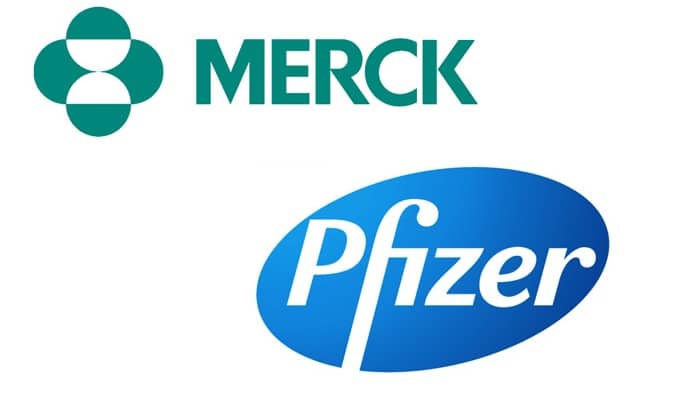Merck KGaA, Darmstadt, Germany, and Pfizer Inc announced that the Phase III JAVELIN Gastric 300 trial did not meet its primary endpoint of superior overall survival (OS) with single-agent avelumab* compared with physician’s choice of chemotherapy. The trial investigated avelumab as a third-line treatment for unresectable, recurrent or metastatic gastric or gastroesophageal junction (GEJ) adenocarcinoma patients whose disease progressed following two prior therapeutic regimens, regardless of programmed death ligand-1 (PD-L1) expression. The safety profile of avelumab was consistent with that observed in the overall JAVELIN clinical development program.
“Gastric cancer in the third-line setting is a particularly hard-to-treat and heterogeneous disease, and importantly, this was the first trial conducted with a checkpoint inhibitor compared to an active chemotherapy comparator rather than placebo in a global patient population,” said Luciano Rossetti, M.D., Executive Vice President, Global Head of Research & Development at the Biopharma business of Merck KGaA, Darmstadt, Germany, which operates as EMD Serono in the US and Canada. “Data from this study will provide valuable information for physicians treating this late stage disease. We remain committed to our ongoing gastric cancer program with avelumab including the JAVELIN Gastric 100 study in the first-line switch maintenance setting.”
“Gastric cancer is a leading cause of cancer death globally with clear unmet needs, and the results provide important insights as we continue to investigate the role of avelumab for the treatment of gastric cancer,” said Chris Boshoff, M.D., Ph.D., Senior Vice President and Head of Immuno-Oncology, Early Development and Translational Oncology, Pfizer Global Product Development. “With approvals for two cancers in 2017, our companies have made tremendous progress with avelumab on behalf of patients this year, and we are confident that our broad clinical development program in both monotherapy and combinations across a range of cancers will continue to bring new potential treatment options to patients.”
The JAVELIN Gastric 300 data will be further examined in an effort to better understand the results and will also be submitted for presentation at an upcoming medical congress. The outcome of JAVELIN Gastric 300 does not have any impact on current avelumab approvals.
JAVELIN Gastric 300 is a Phase III, multicenter, international, randomized, open-label clinical trial investigating avelumab plus best supportive care versus physician’s choice of protocol-specified chemotherapy (paclitaxel or irinotecan monotherapy) plus best supportive care in patients with unresectable, recurrent or metastatic gastric or GEJ adenocarcinoma whose disease has progressed following two prior therapeutic regimens. The trial enrolled 371 patients from 147 sites in Asia, Australia, Europe, North America and South America. The primary endpoint was OS.
The avelumab gastric clinical development program also includes JAVELIN Gastric 100, a multicenter, randomized, open-label Phase III study evaluating avelumab as first-line maintenance therapy following induction chemotherapy in unresectable, locally advanced or metastatic gastric or GEJ cancer. The trial will continue as planned.
Avelumab is under clinical investigation for treatment of gastric/GEJ cancer and has not been demonstrated to be safe and effective for this indication. There is no guarantee that avelumab will be approved for gastric/GEJ cancer by any health authority worldwide.
About Gastric/Gastroesophageal Junction Cancer
Globally, gastric cancer is the fifth most common cancer but the third most common cause of cancer death.[1],[2] In 2012, there were approximately 950,000 new cases and 723,000 deaths worldwide.[3] Of these cancers, 90 to 95 percent were adenocarcinomas.[4] Incidence varies by country, with higher rates seen in Central/Eastern Europe, Eastern Asia and South America.[5] Survival in advanced disease is poor and generally less than one year.[6] Globally, there is no recommended therapeutic approach for patients who progress after two lines of therapy for recurrent or metastatic gastric cancer.
About Avelumab
Avelumab is a human anti-programmed death ligand-1 (PD-L1) antibody. Avelumab has been shown in preclinical models to engage both the adaptive and innate immune functions. By blocking the interaction of PD-L1 with PD-1 receptors, avelumab has been shown to release the suppression of the T cell-mediated antitumor immune response in preclinical models.[7]-[9] Avelumab has also been shown to induce NK cell-mediated direct tumor cell lysis via antibody-dependent cell-mediated cytotoxicity (ADCC) in vitro.[9]-[11] In November 2014, Merck KGaA, Darmstadt, Germany, and Pfizer announced a strategic alliance to co-develop and co-commercialize avelumab.
fizer Inc.: Working together for a healthier world®
At Pfizer, we apply science and our global resources to bring therapies to people that extend and significantly improve their lives. We strive to set the standard for quality, safety and value in the discovery, development and manufacture of health care products. Our global portfolio includes medicines and vaccines as well as many of the world’s best-known consumer health care products. Every day, Pfizer colleagues work across developed and emerging markets to advance wellness, prevention, treatments and cures that challenge the most feared diseases of our time. Consistent with our responsibility as one of the world’s premier innovative biopharmaceutical companies, we collaborate with health care providers, governments and local communities to support and expand access to reliable, affordable health care around the world. For more than 150 years, we have worked to make a difference for all who rely on us. We routinely post information that may be important to investors on our website at http://www.pfizer.com
Contact:
Friederike Segeberg
+49-6151-72-6328
Investor Relations
+49-6151-72-3321
Pfizer
Media (US)
Sally Beatty
+1-212-733-6566
Investor Relations
Ryan Crowe
+1-212-733-8160



















